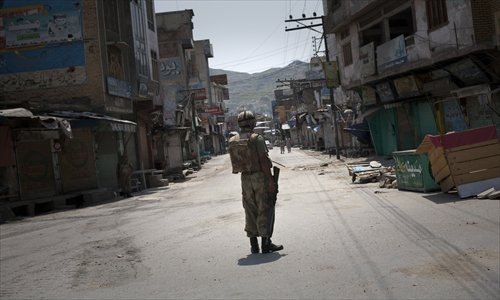HOME >> WORLD
Swat analysis
Source:Reuters Published: 2014-3-6 1:13:04

This picture taken on July 17, 2009 shows Mingora, the major town in Pakistan's Swat Valley. Photo: CFP
Pakistani farmer Wazir Jamal was so upset about being forced off his patch of land to make way for an army base in the Swat Valley that he killed himself, say his family and friends.
The army pushed Pakistani Taliban militants out of the scenic northwestern valley with a big offensive in 2009 and it is determined to keep them at bay.
But in securing Swat with new checkpoints and bases, the army has had to take over land, fuelling resentment among people who were happy to see soldiers chase the Taliban away but now wonder about the cost.
The 53-year-old Jamal, distraught at the thought of losing the means to support his wife and children, became overwhelmed by despair and shot himself, relatives say.
"We're not against the army but please don't rob us of our lives," said Kaleem Ullah, Jamal's 16-year-old son. "The army has driven away the Taliban so why do they need to stay?"
Paradise lost
With its meadows, trout streams and forest-clad Himalayan foothills, Swat, 120 kilometers northwest of the capital, Islamabad, was once a paradise for family holidaymakers, honeymooners and backpackers.
The valley even had Pakistan's only ski resort.
But that all changed when Pakistani Taliban militants infiltrated from the Afghan border and overran the 5,000-square-kilometer valley in 2007.
The militants imposed strict Islamist rule, closed girls' schools, murdered policemen and publicly hanged and beheaded opponents.
The government, struggling against a surge of Islamist violence, prevaricated. The army mounted an initial operation before authorities struck a pact which the militants took advantage of to expand their sway.
Eventually, the army mounted a successful offensive but even after that, the valley was not safe.
Malala Yousafzai, the schoolgirl campaigner for girls' education, was shot and seriously wounded by Taliban gunmen on the way home from her Swat school in October 2012.
Now the government is determined once and for all to secure Swat. Prime Minister Nawaz Sharif recently approved construction of a military complex, known as a cantonment, covering 15 hectares in Swat's Khawazakhela area.
The army fears that the end of more than a decade of US military involvement in nearby Afghanistan will galvanize militants and inspire them to try to seize back Swat.
"The Taliban have been dislocated but have they been eliminated? It's a big question," said a senior military official who was based in Swat until 2012.
"Targeted killings and the murder of pro-government people continue," said the official, who declined to be identified.
But in securing the valley, the army might be sowing discontent that could feed support for the militants they are trying to keep away.
Seeds of support
Community elders say Jamal was one of about 200,000 people in Khawazakhela to lose access to their land because of the construction of the army base.
Much of it is being built on what was for generations a patch-work of orchards.
Apricot farmer Zahir Shah, 65, said soldiers first moved onto his land in 2008.
"We've been waiting for them to leave but now they're building a permanent cantonment. This is an occupying army."
Much land is fenced off and soldiers lurk at orchard gates.
Residents say they need permission to visit their land, tend their trees and harvest their fruit. Soldiers often refuse to let them in, villagers say.
Villagers also complain that the compensation they get is far below the market price. "They want to buy my land for 30 rupees ($0.30) a square foot," said apple farmer Nadar Shah. "That's a joke."
Shah pointed to a piece of muddy ground where a crane sat next to big metal containers that formed a boundary wall. About 20 soldiers stood guard.
"That was my orchard," he said.
Nadar Shah's uncle, Shah Husain, owned one of the biggest apple orchards in the area but the army took it over in 2008 with a promise of $50,000, Husain said. Waving documents in the air, he said he had only got $1,000.
"If this goes on, these dying orchards will become the breeding ground for more Taliban," Husain said.
Swat's Deputy Commissioner Imtiaz Hussain said the villagers were getting proper compensation.
"People have been, and will be, compensated for every tree, every well and every building acquired for the base," Hussain said. "No one is occupying them."
The army declined to comment but one senior officer denied that the army was grabbing land, saying all the land it used had been allotted by the civilian administration.
"The army only builds on the land once it is allotted to us by the district commissioner's office," he said. "This is how it is everywhere, including Swat."
Looming over Swat is the threat of local boy Mullah Fazlullah, who heads the Pakistani Taliban. It was Fazlullah who organized fighters to take the valley over in 2007. He is now based over the border in Afghanistan where he plots his fight against Pakistan, and, many fear, his return to Swat.
"Fazlullah has slowly rebuilt his militia," a Pakistani intelligence official said.
"He has to be kept away. We need this base."
Reuters
Posted in: Asia in Focus